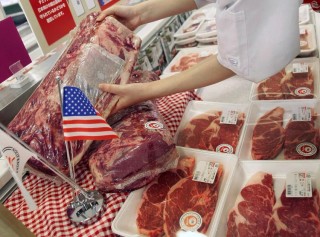Loading
Search
▼ Aso Announces Emergency Tariffs Of 50% On Imported Frozen Beef From Aug
- Category:Gourmet
TOKYO - The Japanese government said Friday it will impose emergency tariffs on frozen beef, widely used in fast food, from the United States and other regions from August after soaring imports prompted by a price hike in Australian beef following a draught.
Japan will raise tariffs on the product from the current 38.5 percent to 50 percent until next March. It is the first time in 14 years Japan has taken the emergency measures on U.S. beef imports, a decision likely to irk Washington.
Imported frozen beef is mainly used in foods such as hamburgers and beef-bowl dishes and could lead to increases in consumer prices.
Allowed under World Trade Organization rules, Japan automatically introduces the so-called safeguard tariffs when imports grow more than 17 percent in a quarter on a year-on-year basis.
Finance Minister Taro Aso told reporters the government is explaining the move to the United States and other countries.
Aso, who doubles as Japan's deputy prime minister, said he is ready to discuss the emergency measure, if requested, at a high-level economic dialogue with U.S. Vice President Mike Pence being arranged for later this year.
Farm minister Yuji Yamamoto told reporters that the effect of the measures on consumers should be "limited" as frozen beef targeted by the measure accounts for 20 percent of the Japan's total beef imports.
Following the Japanese government's announcement, U.S. Meat Export Federation President Philip Seng criticized the decision, saying in a statement, "The safeguard will not only have negative implications for U.S. beef producers, but will also have a significant impact on the Japanese food-service industry."
"It will be especially difficult for the gyudon beef bowl restaurants that rely heavily" on U.S. beef, the statement said. "We will also continue to pursue all opportunities to address the safeguard situation by encouraging the U.S. and Japanese governments to reach a mutually beneficial resolution to this issue."
Trade data released earlier Friday showed that frozen beef imports reached 89,253 tons in the April to June quarter, up 17.1 percent from a year earlier.
The surge is mainly due to a drought in Australia that pushed up its beef prices, making U.S. rivals more competitive, a finance ministry official said.
Japan has also increased its imports in anticipation that U.S. beef prices will soar following the resumption of U.S. beef exports to China, the official said.
The United States is the second-largest supplier of frozen beef to Japan after Australia, together accounting for 90 percent of total imports of the product. Other suppliers include Canada and New Zealand.
Australian beef is exempted from the emergency measure due to the free trade agreement between Japan and Australia.
The tariff hike could become a source of contention with the United States at a time when the administration of President Donald Trump is calling on Tokyo to further open its agricultural market and take steps for "fair trade" with the United States, which continues to run trade deficits with Japan.
© KYODO
Japan will raise tariffs on the product from the current 38.5 percent to 50 percent until next March. It is the first time in 14 years Japan has taken the emergency measures on U.S. beef imports, a decision likely to irk Washington.
Imported frozen beef is mainly used in foods such as hamburgers and beef-bowl dishes and could lead to increases in consumer prices.
Allowed under World Trade Organization rules, Japan automatically introduces the so-called safeguard tariffs when imports grow more than 17 percent in a quarter on a year-on-year basis.
Finance Minister Taro Aso told reporters the government is explaining the move to the United States and other countries.
Aso, who doubles as Japan's deputy prime minister, said he is ready to discuss the emergency measure, if requested, at a high-level economic dialogue with U.S. Vice President Mike Pence being arranged for later this year.
Farm minister Yuji Yamamoto told reporters that the effect of the measures on consumers should be "limited" as frozen beef targeted by the measure accounts for 20 percent of the Japan's total beef imports.
Following the Japanese government's announcement, U.S. Meat Export Federation President Philip Seng criticized the decision, saying in a statement, "The safeguard will not only have negative implications for U.S. beef producers, but will also have a significant impact on the Japanese food-service industry."
"It will be especially difficult for the gyudon beef bowl restaurants that rely heavily" on U.S. beef, the statement said. "We will also continue to pursue all opportunities to address the safeguard situation by encouraging the U.S. and Japanese governments to reach a mutually beneficial resolution to this issue."
Trade data released earlier Friday showed that frozen beef imports reached 89,253 tons in the April to June quarter, up 17.1 percent from a year earlier.
The surge is mainly due to a drought in Australia that pushed up its beef prices, making U.S. rivals more competitive, a finance ministry official said.
Japan has also increased its imports in anticipation that U.S. beef prices will soar following the resumption of U.S. beef exports to China, the official said.
The United States is the second-largest supplier of frozen beef to Japan after Australia, together accounting for 90 percent of total imports of the product. Other suppliers include Canada and New Zealand.
Australian beef is exempted from the emergency measure due to the free trade agreement between Japan and Australia.
The tariff hike could become a source of contention with the United States at a time when the administration of President Donald Trump is calling on Tokyo to further open its agricultural market and take steps for "fair trade" with the United States, which continues to run trade deficits with Japan.
© KYODO
- July 29, 2017
- Comment (0)
- Trackback(0)


